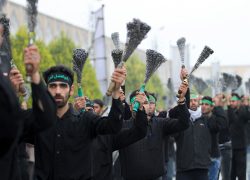Since the old days, local and traditional dolls have been made by the talented women of Badroud and used for decoration on the shelves, for little girls to play with, or as an item in the brides’ dowry.
It was a local tradition that the bride’s mother sewed and made a doll and included that in her daughter’s dowry to be carried to the groom’s house.
This doll remained with the bride so that she could confide in it as a patience stone and fill the void of loneliness.
The materials used for making these dolls included local floral fabrics, needle and thread, felt, carpet fuzz, seashells, and buttons, among others.
When the bride gave birth to her first child, if it was a girl, she would give the doll to her, and if not, she would return the doll to her mother so that it could be included in the family’s other daughter’s dowry and carried to its new home!
However, some families in Badroud have been keeping their dolls as a memento of past generations, placing them on their decorative shelves.
These local dolls were representative of traditional professions and handicrafts of Badroud, and they were mostly made of colourful floral fabrics, which symbolized traditional costumes of this city, introducing them to next generations.
Today, these dolls are still sewed and created using vintage floral fabrics, which are kept in the grandmothers’ chests.
These dolls—which are dressed in the traditional clothes of this district—are also created using the old methods of sewing and filled with wool scraps and carpet fuzz.
Moreover, all the dolls come with a personal and professional certificate, and they are all made in accordance with environmental standards.
The dolls echo the names of the ancestors of Badroud’s current inhabitants, honoured men and women in history, each representing a specific profession or an activity related to traditional ceremonies and rituals.
The dolls are named after the first potter, perfumer, builder, shepherd, tailor, postman, camel herder, calligrapher, and teacher among men and the first midwife, bonesetter, and carpet weaver among women.







